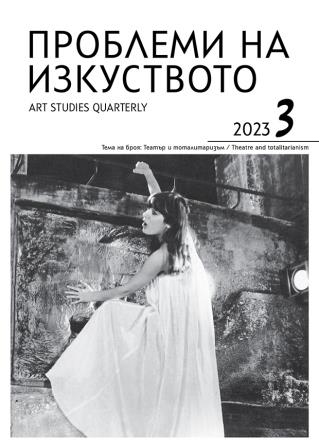Режисьорска свръхинтерпретация и групи на съмишленици в българския театър в периода 1956-1968
Director’s overinterpretation and groups of adherents in the Bulgarian theatre during the period 1956-1968
Author(s): Kamelia NikolovaSubject(s): Theatre, Dance, Performing Arts, Fine Arts / Performing Arts
Published by: Институт за изследване на изкуствата, Българска академия на науките
Keywords: Bulgarian stage directors; socialist realism; theatre and politics; allegorical director’s interpretation; theatre of adherends
Summary/Abstract: The study examines Bulgarian theatrе during the period 1956–1968 in the overall context of the development of the European scene during this turbulent time of renewal and aesthetic revolutions. The focus of the study is on two main trends de-fining theatrical art during the commented decade. Between 1956 and 1968, European scenes were flooded with bright and original spectacles, daring experiments and exciting discoveries on both sides of the Iron Curtain. The reasons for this impressive creativity and vitality of the theatre in such a complex historical period are numerous and various, including aesthetic and political, but the main among them is the changed strategy of the director to-wards the drama. This is exactly the time when the process of rejecting the primacy of the dramatic text by the director, proceeding in two opposite directions, begins. One of these directions is the director’s over-interpretation of classical and con-temporary plays, i.e. their subjective free re-reading of the scene by the director, whereby the text remains formally intact, but new meanings and messages are emphasized or brought to it, most often of a political or psychoanalytic nature. The second direction is the rapid emergence and development of laboratory theatre and, in general, experimental or neovanguard theatre, which became the true theatrical emblem of the 1960s in Western Europe-an countries, as well as in some specific cases – in Poland and Czechoslovakia. The aim of the study is to trace the specific transformation in the Bulgarian theatre of these two basic trends in the “Aesopian direction” and in the creation of the so-called “groups of adherents”, caused by the policy of ideological control and limit-ed freedom in the countries of the Eastern Bloc in this period.
Journal: Проблеми на изкуството
- Issue Year: 2023
- Issue No: 3
- Page Range: 20-32
- Page Count: 13
- Language: Bulgarian
- Content File-PDF

